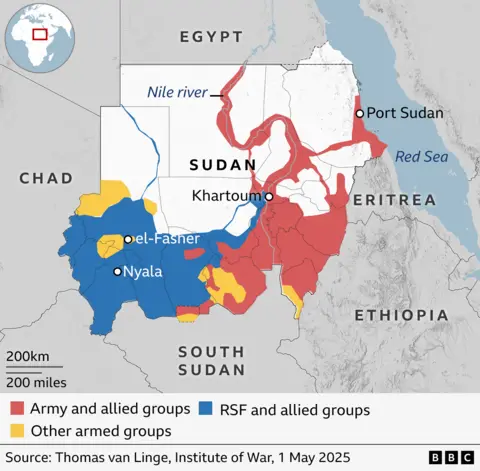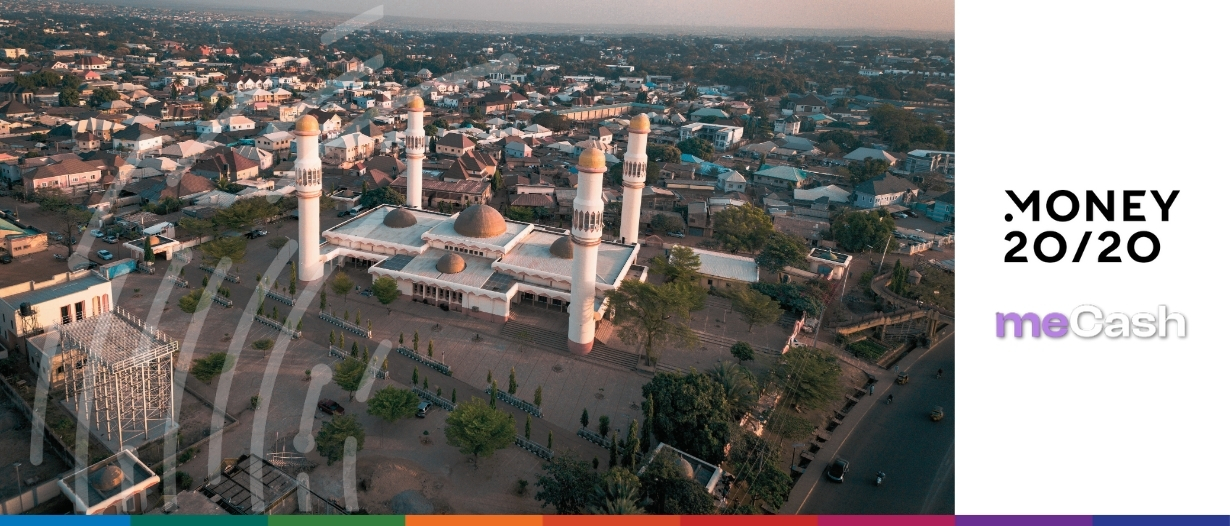Sudan war: A simple guide to what is happening
Since then, Gen Dagalo has built a powerful force that has intervened in conflicts in Yemen and Libya.
He also controls some of Sudan's gold mines, and allegedly smuggles the metal to the United Arab Emirates (UAE).
The army accuses the UAE of backing the RSF, and carrying out drone strikes in Sudan. The oil-rich Gulf state denies the allegation.
The army also accuses eastern Libyan strongman Gen Khalifa Haftar of supporting the RSF by helping it to smuggle weapons into Sudan, and sending fighters to bolster the RSF.
In early June 2025, the RSF achieved a major victory when it took control of territory along Sudan's border with Libya and Egypt.
The RSF also controls almost all of Darfur and much of neighbouring Kordofan.
It has declared plans to form a rival government, raising fears that Sudan could split for a second time - South Sudan seceded in 2011, taking with it most of the country's oil fields.
The military controls most of the north and the east. Its main backer is said to be Egypt, whose fortunes are intertwined with those of Sudan because they share a border and the waters of the River Nile.
Gen Burhan has turned Port Sudan - which is on the Red Sea - into his headquarters, and that of his UN-recognised government.
However, the city is not safe - the RSF launched a devastating drone strike there in March.
This was retaliation after the RSF suffered one of its biggest setbacks, when it lost control of much of Khartoum - including the Republican Palace - to the army in March.
"Khartoum is free, it's done," Gun Burhan declared, as he triumphantly returned to the city, though not permanently.
Some analysts say the conflict is in a strategic stalemate and the army still does not have total control of Khartoum, despite deploying newly acquired weapons from Egypt, Turkey, Qatar and Iran.
The city is a burnt-out shell: government ministries, banks and towering office blocks stand blackened and burned.
The tarmac at the international airport is a graveyard of smashed planes, its passport and check-in counters covered in ash.
Hospitals and clinics have also been destroyed, hit by air strikes and artillery fire, sometimes with patients still inside.
The army has also managed to win back near total control of the crucial state of Gezira. Losing it to the RSF in late 2023 had been a huge blow, forcing hundreds of thousands of civilians to flee its main city of Wad Madani, which had become a refuge for those who had escaped conflict in other parts of the country.
El-Fasher is the last major urban centre in Darfur still held by the army and its allies. The RSF has laid siege to the city, causing hundreds of casualties, overwhelming hospitals and blocking food supplies.
Month after month of blockade, bombardment and ground attacks have created famine among the residents, with the people of the displaced camp of Zamzam worst-hit.


Many Darfuris believe the RSF and allied militias have waged a war aimed at transforming the ethnically mixed region into an Arab-ruled domain.
In March 2024, the UN children's agency, Unicef, gave harrowing accounts of armed men raping and sexually assaulting children as young as one.
Some children have tried to end their own lives as a result.
In the same month, campaign group Human Rights Watch (HRW) said it was possible that the RSF and allied militias were carrying out a genocide in Darfur against the Massalit people and other non-Arab communities.
Thousands had been killed in el-Geneina city in a campaign of ethnic cleansing with the "apparent objective of at least having them permanently leave the region", it said.
HRW added that the widespread killings raised the possibility that the RSF and their allies had "the intent to destroy in whole or in part" the Massalit people.
As this could constitute a genocide, it appealed to international bodies and governments to carry out an investigation.
A subsequent investigation by a UN team fell short of concluding that a genocide was taking place. Instead, it found that that both the RSF and army had committed war crimes.
However, the US determined in January this year that the RSF and allied militias have committed a genocide.
"The RSF and allied militias have systematically murdered men and boys - even infants - on an ethnic basis, and deliberately targeted women and girls from certain ethnic groups for rape and other forms of brutal sexual violence," then-Secretary of State Anthony Blinken said.
"Those same militias have targeted fleeing civilians, murdering innocent people escaping conflict, and prevented remaining civilians from accessing lifesaving supplies. Based on this information, I have now concluded that members of the RSF and allied militias have committed genocide in Sudan," he added.
This led to the US imposing sanctions on Gen Dagalo, followed by similar measures against Gen Burhan.
Sudan's government filed a case against the UAE in the International Court of Justice (ICJ), accusing it of being complicit in the genocide by funding and arming the RSF.
However, the ICJ refused to hear the case, saying that it had no jurisdiction over it.
The UAE welcomed its ruling, with an official saying that the Gulf state "bears no responsibility for the conflict".
The RSF also denies committing genocide, saying it was not involved in what it describes as a "tribal conflict" in Darfur.
But the UN investigators said they had received testimony that RSF fighters taunted non-Arab women during sex attacks with racist slurs and saying they will force them to have "Arab babies".
There have been several rounds of peace talks in Saudi Arabia and Bahrain - but they have failed.
BBC deputy Africa editor Anne Soy says that both sides, especially the army, have shown an unwillingness to agree to a ceasefire.
UN health chief Tedros Adhanom Ghebreyesus has also lamented that there is less global interest in the conflict in Sudan, and other recent conflicts in Africa, compared to crises elsewhere in the world.
"I think race is in the play here," he told the BBC in September 2024.
The International Crisis Group (ICG) think-tank has called diplomatic efforts to end the war "lacklustre", while Amnesty International has labelled the world's response "woefully inadequate".
Humanitarian work has also been badly affected by the decision of the Trump administration to cut aid.
Aid volunteers told the BBC that more than 1,100 - or almost 80% - of the emergency food kitchens have been forced to shut, fuelling the perception that Sudan's conflict is the "forgotten war" of the world.

 Getty Images/BBC
Getty Images/BBC










